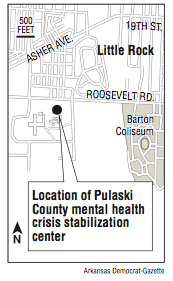After minor fits and starts, Pulaski County firmed up a location and medical service provider for its mental health crisis stabilization center, a county administrator said Tuesday.
When operational, the center will treat adults who encounter a trained police officer or sheriff's deputy while in the throes of a mental health crisis.
The 16-bed unit will occupy the Pulaski County District Court building at 3001 W. Roosevelt Road, Justin Blagg told the county's criminal justice coordinating committee. Blagg is the director of Quorum Court services.
The Roosevelt building is home to the district court, juvenile court and the juvenile jail. Part of the jail will be redesigned to house the crisis stabilization unit, a Pulaski County spokesman said in an email.
Coordinating committee members -- including Little Rock Police Chief Kenton Buckner and Pulaski County Sheriff Doc Holladay -- meet once a month to discuss solutions to ongoing problems in the criminal justice system.
The committee, and the crisis stabilization centers, were authorized under Act 423 of the 2017 legislative session.
About $6.4 million in state money was budgeted for four centers to treat mentally ill Arkansans for short spurts, typically 72 hours or less. The goal is for people who experience an episode of mental instability to avoid jail, where they generally stay longer than their counterparts who don't have mental health issues.
Pulaski, Sebastian, Craighead and Washington counties were chosen to sponsor the facilities for their surrounding regions. Those counties must find buildings for the centers and pay the utilities. The state reimburses other expenses.
On Oct. 24, the Pulaski County Quorum Court unanimously appropriated $1 million to pay the center's startup costs.
At that time, the county hadn't selected a permanent location, so $40,000 was slated for rent on both the land and the building.
Since the location they chose is county-owned and therefore free from a lease, that money will be reallocated, county spokesman Cozetta Jones said in an email.
Treating the mentally ill instead of locking them up for minor crimes could help free up jail space, proponents of the centers say.
Holladay arrived at Tuesday's meeting armed with statistics on how many mentally ill people inhabit the 1,210-bed facility he oversees in Pulaski County.
The jail processed around 23,000 people between July 1, 2016, and July 31, 2017. About 1,500 of those people were arrested three or more times in that span.
Of that group, almost 400 of them were diagnosed with some form of mental disorder while at the jail, according to a handout Holladay distributed.
Those people comprise a "cohort group," meaning they're the ones likely to be treated at the crisis center.
In the initial proposal created by County Judge Barry Hyde's office, the plan was to open a temporary center on the University of Arkansas for Medical Sciences, Little Rock campus.
That idea was later scrapped after the county's proposal was submitted in mid-September.
County officials kept negotiating with UAMS administrators about providing the medical personnel for the permanent facility. Eventually, those conversations "got bogged down to the point of nothing was really moving anymore," Blagg said.
On Oct. 6, the county issued a request for proposals as "kind of a reset button," he said.
Three groups -- Preferred Family Healthcare, Little Rock Community Mental Health Center and UAMS -- submitted strong options, he said.
A three-person panel chose the UAMS plan, largely because of the academic hospital's data collection and analytic abilities, Blagg said. He expects the contract to be inked with the hospital before mid-December.
Jones declined to release the UAMS proposal, saying it would give an unfair advantage to others who responded.
Dr. Lisa Evans will direct the crisis unit, said UAMS spokesman Leslie Taylor. An exact number of staff members has not been hammered out, but the center will need support 24 hours a day, seven days a week, she said.
The center will employ psychiatrists, nurses, social workers and mental health technicians, she said.
If all goes according to plan and no inclement weather interrupts renovations on the county building, the center should be up and running by late February or early March, Blagg said.
Metro on 11/22/2017
